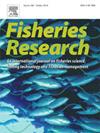气候压力因素、粮食安全以及妇女在海产品生产系统中的参与决策
IF 2.3
2区 农林科学
Q2 FISHERIES
引用次数: 0
摘要
如果管理得当,海产品生产系统可以为沿海社区数百万人提供可持续和气候适应型的富含营养和蛋白质的食物和就业来源。然而,由于各种社会、经济和气候变化的压力,海产品的产量正在下降,影响了以渔业为基础的生计,也影响了一些参与者继续捕捞的决定。本研究以冈比亚的小规模女性牡蛎捕捞者为例,评估以渔业为基础的生计活动、气候压力因素、气候适应和家庭粮食安全如何影响受访者继续捕捞的意愿。横断面数据来自冈比亚16个牡蛎社区的357名女性牡蛎收获者。我们发现,在5年的召回期内,女性牡蛎采集者对温度升高、风暴增加和雨天减少的感知与继续采牡蛎的意愿呈负相关。同样,我们显示了女性牡蛎采收者的继续意愿与粮食不安全家庭之间的负相关关系。同时,受访者将继续种植红树林作为一种气候适应策略的意愿与参与之间建立了正相关关系。这项研究提出了需要关注海产品生产系统及其现在和未来可持续性所面临的挑战的论点。本研究强调的经验证据为冈比亚和其他发展中国家支持气候适应性海产品生产系统、生计多样化和粮食安全的政策、战略和干预措施提供了强有力的依据。本文章由计算机程序翻译,如有差异,请以英文原文为准。
Climate stressors, food security, and participation decisions among women in seafood production systems
If properly managed, seafood production systems can provide a sustainable and climate-resilient source of nutrient and protein-rich food and employment for millions of people in coastal communities. However, seafood is declining due to myriad social, economic, and climate change stressors, affecting fishery-based livelihoods and the decision for some actors to continue harvesting. This study uses the case of small-scale women oyster harvesters in The Gambia to assess how fishery-based livelihood activities, climate stressors, climate adaptation, and household food security influence surveyed respondents' willingness to continue harvesting. Cross-sectional data were collected from 357 women oyster harvesters in 16 oyster communities in The Gambia. We show a negative association between willingness to continue with women oyster harvesters’ perception of increasing temperatures, increasing storms, and decreasing rainy days over a 5-year recall period. Similarly, we show a negative association between women oyster harvesters’ willingness to continue and food-insecure households. Meanwhile, a positive relationship was established between respondents' willingness to continue and participation in planting mangrove trees as a climate adaptation strategy. This study advances the argument for the need to pay attention to challenges facing seafood production systems and their sustainability now and in the future. The empirical evidence highlighted in this study provides a strong rationale for policies, strategies, and interventions that support climate-resilient seafood production systems, livelihood diversification, and food security in The Gambia and other developing countries.
求助全文
通过发布文献求助,成功后即可免费获取论文全文。
去求助
来源期刊

Fisheries Research
农林科学-渔业
CiteScore
4.50
自引率
16.70%
发文量
294
审稿时长
15 weeks
期刊介绍:
This journal provides an international forum for the publication of papers in the areas of fisheries science, fishing technology, fisheries management and relevant socio-economics. The scope covers fisheries in salt, brackish and freshwater systems, and all aspects of associated ecology, environmental aspects of fisheries, and economics. Both theoretical and practical papers are acceptable, including laboratory and field experimental studies relevant to fisheries. Papers on the conservation of exploitable living resources are welcome. Review and Viewpoint articles are also published. As the specified areas inevitably impinge on and interrelate with each other, the approach of the journal is multidisciplinary, and authors are encouraged to emphasise the relevance of their own work to that of other disciplines. The journal is intended for fisheries scientists, biological oceanographers, gear technologists, economists, managers, administrators, policy makers and legislators.
 求助内容:
求助内容: 应助结果提醒方式:
应助结果提醒方式:


